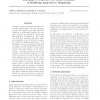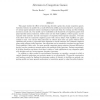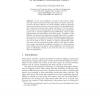21 search results - page 2 / 5 » Social Learning Algorithms Reaching Nash Equilibrium in Symm... |
ICML
2003
IEEE
14 years 6 months ago
2003
IEEE
Learning in many multi-agent settings is inherently repeated play. This calls into question the naive application of single play Nash equilibria in multi-agent learning and sugges...
AI
2004
Springer
13 years 5 months ago
2004
Springer
Efficient Learning Equilibrium (ELE) is a natural solution concept for multi-agent encounters with incomplete information. It requires the learning algorithms themselves to be in ...
CORR
2008
Springer
13 years 5 months ago
2008
Springer
This paper studies the effects of introducing altruistic agents into atomic congestion games. Altruistic behavior is modeled by a trade-off between selfish and social objectives. ...
GECCO
2010
Springer
13 years 5 months ago
2010
Springer
This paper takes an economic approach to derive an evolutionary learning model based entirely on the endogenous employment of genetic operators in the service of self-interested a...
AI
2006
Springer
13 years 9 months ago
2006
Springer
So far, most equilibrium concepts in game theory require that the rewards and actions of the other agents are known and/or observed by all agents. However, in real life problems, a...



